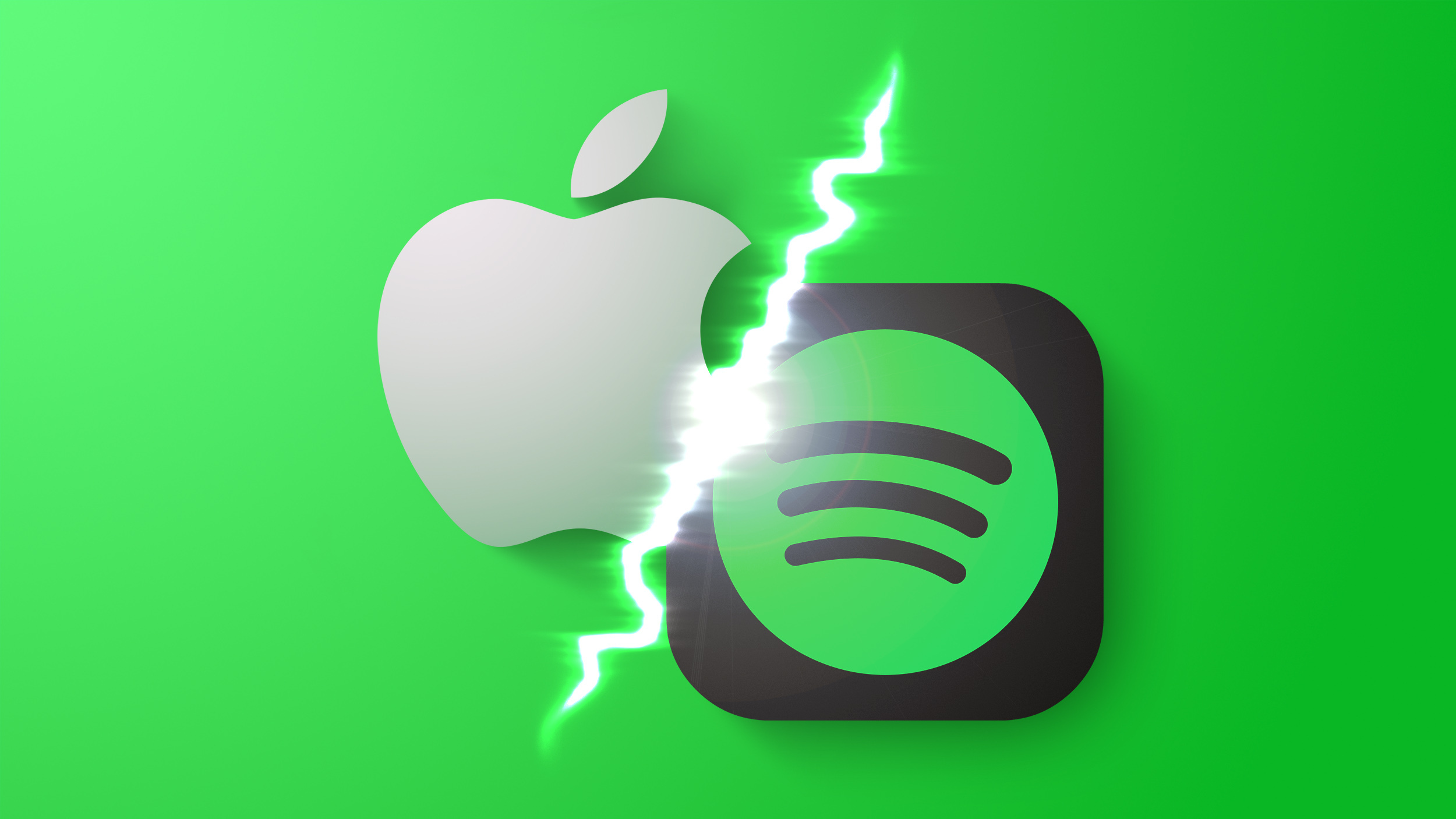Spotify Pens Joint Letter Calling Apple 'Harmful' and 'Anti-Competitive,' Claims App Store Ruins Business
Spotify and eight companies and associations have written a letter to the EU Commission's executive vice president calling Apple a harmful, anti-competitive, and monopolistic company that must be regulated through "urgent action."

The letter, signed by the CEOs and heads of Basecamp, Deezer, Proton, Schibsted, Spotify, European Publishers Council (EPC), France Digitale, and News Media Europe, was sent to Margrethe Vestager of the EU. The letter urges the EU to take regulatory action and conclude an ongoing investigation triggered by Spotify against Apple's app distribution practices.
The group claims Apple's App Store has hindered their businesses and consistently makes it difficult for them to grow due to the platform's policies and its "capricious changes to terms and conditions."
In April 2021, the EU published the Commission's Statement of Objections against Apple, outlining its findings after an investigation of unfair App Store practices. In the statement, the EU said Apple "abused its dominant position for the distribution of music streaming apps through its App Store" and that it takes issue with the "mandatory use of Apple's own in-app purchase mechanism imposed on music streaming app developers to distribute their apps." Now, the group of companies claims these alleged wrongdoings are experienced by "countless other app providers" and not just music streaming apps.
Although Spotify has been vocal about its disapproval of Apple's App Store, the music streaming service has neglected widespread requests to add HomePod support to its app, despite many of its competitors doing so. As a result, some Spotify customers have switched to other platforms, such as Apple Music. In an independent blog post on its website this week, Spotify said, "Apple has been enabled by the lack of decisive action by regulators, who continue to move hesitantly, even in the face of a groundswell of support."
This article, "Spotify Pens Joint Letter Calling Apple 'Harmful' and 'Anti-Competitive,' Claims App Store Ruins Business" first appeared on MacRumors.com
Discuss this article in our forums
Source: TechRadar

The letter, signed by the CEOs and heads of Basecamp, Deezer, Proton, Schibsted, Spotify, European Publishers Council (EPC), France Digitale, and News Media Europe, was sent to Margrethe Vestager of the EU. The letter urges the EU to take regulatory action and conclude an ongoing investigation triggered by Spotify against Apple's app distribution practices.
The group claims Apple's App Store has hindered their businesses and consistently makes it difficult for them to grow due to the platform's policies and its "capricious changes to terms and conditions."
For years, Apple has imposed unfair restrictions on our businesses. These restrictions hamper our development and harm European consumers. They include the tying of the App Store to Apple's proprietary payment system, with its excessive commissions for app developers; the creation of artificial obstacles that prevent our businesses from freely communicating with our customers; restrictions to developers' access to data of their own users; and capricious changes to terms and conditions. Apple benefits from a monopoly position over its mobile ecosystem and extracts exorbitant rents from app developers who have no choice but to remain on the App Store to reach European consumers."The time has come for urgent action from the EU to end Apple's abusive behaviors," the letter says, citing the newly passed Digital Markets Act (DMA) and calling for its swift enforcement. "The EU has the opportunity to take the lead, but it must act fast, as every day that passes is a loss for innovation and for the welfare of European consumers," it continues.
In April 2021, the EU published the Commission's Statement of Objections against Apple, outlining its findings after an investigation of unfair App Store practices. In the statement, the EU said Apple "abused its dominant position for the distribution of music streaming apps through its App Store" and that it takes issue with the "mandatory use of Apple's own in-app purchase mechanism imposed on music streaming app developers to distribute their apps." Now, the group of companies claims these alleged wrongdoings are experienced by "countless other app providers" and not just music streaming apps.
We therefore call for a rapid decision in the competition case against Apple for its illegal, anti-competitive behavior involving music streaming services. Many of the anti-competitive behaviors described in the Commission's Statement of Objections against Apple are felt not only by music streaming services but by countless other app providers who wish to offer goods and services via the iOS App Store. That Statement of Objections is nearly two years old and the abuses and consumer harm will continue until a remedy is enforced. Beyond the specific App Store case, the EU authorities urgently need to look at Apple's abusive behavior in other areas as well, such as publishing, web software, communications, and marketplaces.Apple has been repeatedly accused of unfair and anti-competitive business practices in its App Store, with Spotify being one of the most vocal critics. In October, Spotify published a press release accusing Apple of damaging "Spotify's and other developers' abilities to provide a seamless user experience" and stated these restrictions "hurt both creators and consumers alike."
Although Spotify has been vocal about its disapproval of Apple's App Store, the music streaming service has neglected widespread requests to add HomePod support to its app, despite many of its competitors doing so. As a result, some Spotify customers have switched to other platforms, such as Apple Music. In an independent blog post on its website this week, Spotify said, "Apple has been enabled by the lack of decisive action by regulators, who continue to move hesitantly, even in the face of a groundswell of support."
This article, "Spotify Pens Joint Letter Calling Apple 'Harmful' and 'Anti-Competitive,' Claims App Store Ruins Business" first appeared on MacRumors.com
Discuss this article in our forums
Source: TechRadar